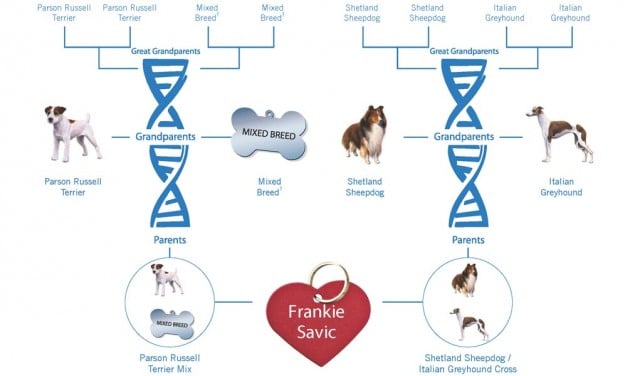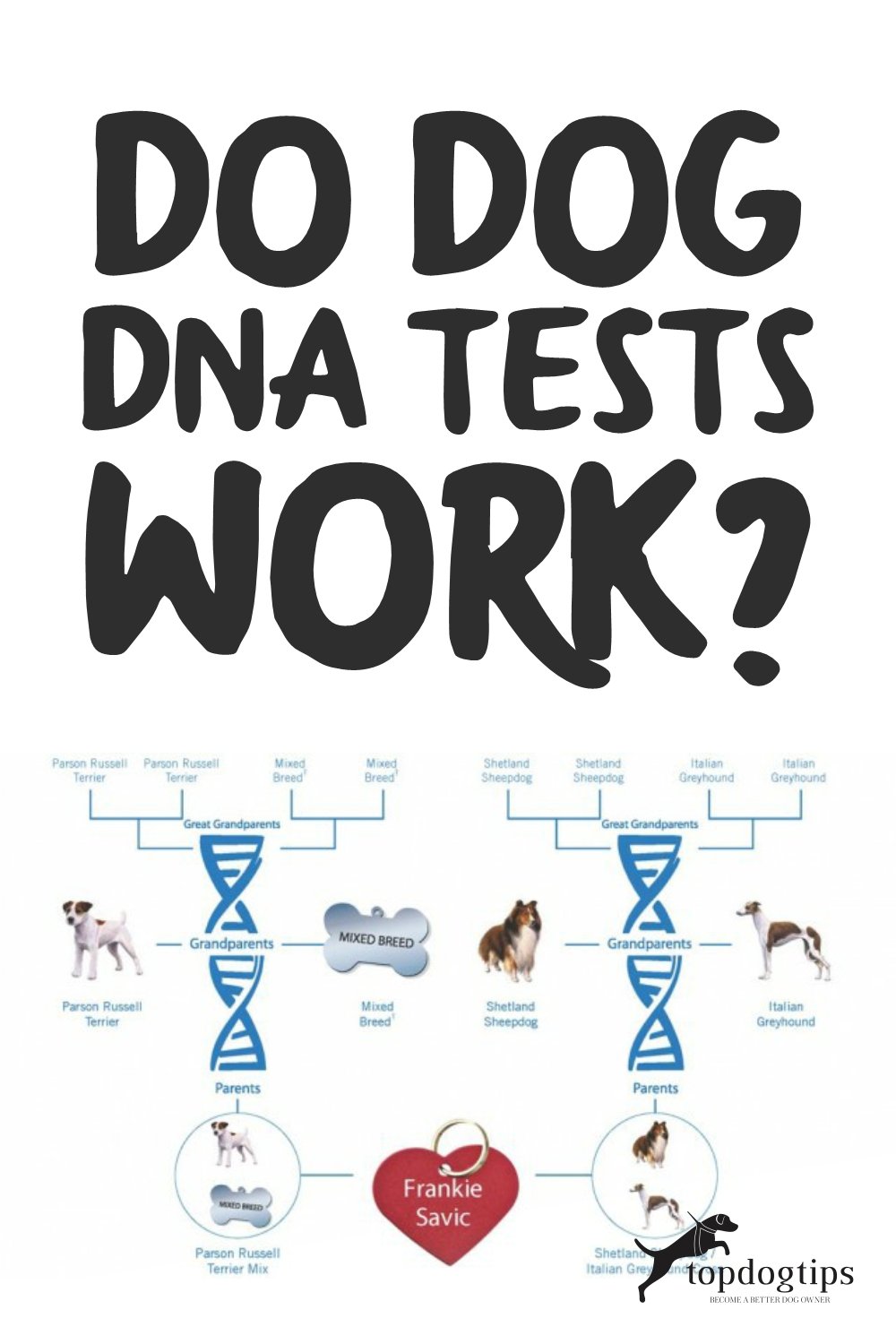
Most people today still get confused by the mention of dog DNA tests.
We usually picture either some drama-filled talk show episode or people using DNA to track their ancestry back hundreds of years through numerous generations.
Did you know that the best DNA test for dogs isn’t just made for confused or curious people?
If you use standard DNA tests for dogs, they will help you with finding out what sort of breed your pet is if he appears to be of mixed heritage.
READ: This Year's Top 5 Best Dog DNA Tests
However, a company that's fairly new to this scene called Embark has developed a new type of doggy DNA test that also provides owners with information about potential health problems and genetic diseases.

If you're curious about how these dog DNA tests work, how effective they are and what the whole process looks like, read and watch our review of the now popular dog DNA test from Embark below.
For more information, you can also listen to our podcast interview.
READ & WATCH MORE: Embark Dog DNA Test Kit Review and Testing the Test
Why do we even need to know our dog's breed?
An owner might have suspicions as to what type of breeds make up their pet's heritage.
However, dog DNA tests are the most accurate (even if not 100%) way to find out your pet's ancestry that we currently have today.
It's really difficult to find more than one of the best DNA tests for dogs since most of them provide information about the breeds alone.
You use them to learn more about your dog and exactly what types of breed DNA he has.
Embark's DNA test, which is a unique option, also provides information on what diseases your canine may be genetically predisposed to and experience in the future.
53% OF ALL DOGS IN THE UNITED STATES ARE MIXED BREEDS.
Finding out the breed of your dog will allow you to potentially foresee any breed-related illnesses or complications that you should expect.
Possibly even prevent it from happening in your Fido.
For example, English Setters are susceptible to Acute Respiratory Infections, and Shetland Sheepdogs are at risk for Lanced Canine Teeth (mesioversion).
This information could be very beneficial for the pet owner and the veterinarian.
There are many other reasons why pet owners choose to use a dog DNA test with their canines, including:
- Satisfying their own curiosity
- Confirming purebred dogs' pedigree
- Anticipating dogs' appearances
- Health concerns
- Exercise requirements
- Temperament
Many people who haven't taken the time to do research on DNA tests for dogs don't understand their value, but you can learn a lot about your pooch by performing one of these simple tests.
DNA testing can be done at your veterinarian's office at an extra cost, or you can simply order one in-home dog DNA testing kit from online retailers like Amazon.
One of the most popular dog DNA tests around today is the Wisdom Panel 3.0 Canine DNA Test Kit (pictured on the right).
Additionally, you should also check out sites of other dog DNA companies: DDC Veterinary, Wisdom Panel, and DNA My Dog.
Do dog DNA tests work? How accurate are they?
So far, the answer to whether or not dog DNA tests work has been an almost unambiguous Yes.
Although dog DNA testing kits are less frequently used than human ones, they are slowly becoming more common.
RELATED: Best Dog for Kids: Safe and Fun Breeds
The first dog DNA tests became available to the general population of pet owners back in 2007.
From that point on, companies have been working on improving these testing kits to have them even more accurate and consistent across the board.
How do dog DNA testing kits work?
These DNA tests for dogs use microsatellites.
Which are repeating sequences of DNA or single-nucleotide polymorphisms, which are tiny genomic mutations [1, 2, 3].
These microsatellites or mutations act as “markers” that researchers implement in order to identify each breed.
The markers make up breed signatures and “signifiers” that, when observed, are able to illuminate the heritage of the dog being tested.
In the 2004 journal Science, geneticist Elaine Ostrander and her colleagues tested this type of DNA identification to confirm its accuracy.
They found, resoundingly, that the utilization of microsatellites or single-nucleotide polymorphisms was a reliable way to determine the breed ancestry of a dog [4].
This scientific substantiation came just a few years before the commercial release of pet DNA tests for dogs.
When these testing kits were first sold, they were only able to detect 38 breeds.
Anything other than those 38 was registered as inconclusive. Now, the tests’ identification ability has soared to well over one hundred.
That's why we keep seeing companies like Wisdom Panel releasing new versions of their product every few years.
Speaking of which, the famous dog DNA firm has recently released its update.
The most current test is through their Mars Veterinary brand – Embark Dog DNA Test (pictured on the left).
Much like with any other product on the market, the prices of dog DNA tests vary greatly, and you will get what you pay for.
Every dog DNA testing company has a database of canine DNA samples that they use to compare your pet's DNA.
Typically, the more expensive a test is (and some of them run upwards of $100), the more breeds they have in their database.
This is a good thing.
Obviously, the more breeds they have to compare to, the more likely it is they will find a match for your pet's DNA.
Simply put, the greater the company's database, the more accurate your test results will be.
At the time of my writing this article, Wisdom Panel had the widest range of breed DNA, and their product is considered the most accurate test yet.
How to use a dog DNA testing kit with your pet
For those of you who have ever dealt with human DNA testing, the process is very similar.
It goes without saying that to test a dog's DNA for ancestry; we first need a piece of their DNA.
Usually, this can come in the form of dog hair, fingernails, bodily fluid, or any number of sources.

However, for canine-specific DNA tests, saliva is the most frequently used and advised.
In your DNA testing kit, you'll have two (1) DNA cheek swabs, (2) a swabs' drying set, (3) an instructions sheet, and (4) a pre-paid shipping label.
How to acquire dog DNA
The process of acquiring your dog's DNA itself is very simple, easy to do, and most importantly, quick:
- You'll carefully take Swab #1 out of its sleeve
- Gently roll the swab on the inner part of your Fido's cheek for 15 seconds
- Place the swab into the drying set
- Repeat the above for Swab #2
- Activate your DNA testing kit online by following the instructions here
- Place the two swabs back into the sleeve
- Mail the test to the lab
- Wait for results (usually takes 2-3 weeks)
More in-depth instructions are provided with the DNA testing kit.
The process is extremely simple, quick, and easy, and if you follow the instructions well, there's no way to screw this thing up.
Remember that some dogs can get spooked at the idea of getting their mouth swabbed.
Which is how this test is performed. Before you proceed, make sure that the animal is kept comfortable and that someone is gently holding your pooch to keep him steady.
Most dog DNA tests will ask you to swab the inside of your dog’s cheek several hours after the dog has last eaten.
Then, you simply place the swab into the container that is provided and mail it back to the testing lab.
There, the DNA markers will be analyzed, and breed signatures will be identified.
RELATED: What Breed is My Dog?
Generally, this process takes several weeks.
Make sure to read the instructions that come with the kit, as the aforementioned outline isn’t necessarily patent for all tests.
The instructions should also give you a timeline of when you can expect to get the results back.
The cost of these tests varies, but they ordinarily are over $60.
The price of DNA testing kits isn’t necessarily the sole determinate of quality, but usually, if the test is expensive, it is probably more reliable and of a higher quality.
You can also see the popularity rating of these tests on online retailers like Amazon and read other dog owners' reviews of how happy they were with the results.
Also, keep in mind that if a dog is a mixed breed and comes from a great many breeds.
Each with just a small contribution to the total.
Then the breed test may be unable to identify most or all of the breeds contributing to the dog,” – says Nathan Sutter, Ph.D., assistant professor of medical genetics at Cornell University.
This means that if your dog has an ancestry of 20 different breeds and each breed only makes up 5% of your canine's DNA, it may be very difficult to identify every one of the breeds.
However, if your pooch is 40% German Shepherd, 30% Labrador Retriever, or 20% Boxer,
The rest is made up of small percentages of a large mix of breeds; the test will surely be able to tell you the major contributing breeds that make up his DNA.
Why do people use dog DNA tests?
So, do dog DNA tests work? Yes, it would seem so.
Not only do they work, but like most other products in the science and technology fields, their accuracy is steadily increasing.
If you're interested in more information about DNA testing in dogs, you can read some of the articles that I've written about the subject, including:
- Dog DNA is Being Turned Into Beautiful Works of Art
- Owners That Don't Scoop Could be Caught by DNA Evidence
An area in which dog DNA testing has really sprung up is the pet adoption field.
Owners looking to adopt dogs are using these tests more often every year in order to gain information about their dog's health, potential illnesses, and temperament.
The reason people use them is that dog DNA tests benefit both the prospective owners and the dogs that are about to be adopted.
Unfortunately, owners sometimes are unsure about the breed of the dog when they adopt it and later find themselves overwhelmed.
A situation where they might even send the dog back to the pound.
A DNA test can help to avoid that outcome [5].
Knowing the breed ahead of time, even if it means paying a small fee, gives the pet adopter information on the many aspects that accompany a dog’s heritage, be it health-related, physical, mental, or emotional.
For example, on a smaller scale, if a prospective dog owner is away from home working for 8 hours a day.
It would not be good for them to adopt a breed that has a history of high levels of separation anxiety and may be destructive while they are gone.
On a bigger scale, knowing your pooch's DNA will tell you what serious illnesses he might develop with age.
Which can be something to prevent or at least prepare for.
Also, a DNA test will assist in identifying what the dog will look like as he ages.
The size and weight of a dog matter greatly when it comes to picking a home for your Fido.
The size of a dog often correlates to how much vigorous exercise the animal will require.
Looks can be deceiving when dogs are puppies.
The runt of the litter might appear very puny, but he or she could grow up to be the size of a Mastiff [6].
RELATED: How to Choose a Dog Breed: Make the Best Choice
It's not just mixed breeds that need to have their DNA tested, either.
Purebred dogs are outrageously expensive, and any dog owner who adopts or purchases a purebred canine will usually have picked that specific breed for a good reason.
A lot of purebred dog owners will use DNA testing to ensure the accuracy of their dog's breed to make sure they aren't getting scammed.
How do owners find out the results of dog DNA testing
After you have mailed the two swabs with your Fido's DNA, it will take about 2-3 weeks to receive the results.
Once the results are in, they will likely come in the form of a list with percentages detailing how much of one breed your dog is made up of.
Here are a few sample dog DNA test reports from Wisdom Panel's website (in PDFs) so that you can get a better idea of what to expect and especially pay attention to what kind of information you will NOT receive with the report:
* For more, see here other dog owners' dog DNA test reviews and the sample reports they have included with their review. Pay attention to both positive and negative opinions, because both contain some valuable information to learn about DNA testing with canines.
As you can see in the sample report, the company will provide owners with some information on the breed.
But it would be wise for you to take some time and do your own research on the dog breeds that your Fido has tested significantly for.
Along with all the health information this will provide you with, it can also give you a heads-up on any techniques for behavioral training you may need to incorporate into your pet coaching regimen.

For example, if the results of your canine display indicate that he has a dominant chunk of Chihuahua DNA.
This could put the animal at risk for some of the behavioral problems known to accompany Chihuahuas.
Such as neuroses and other antisocial traits. When training the dog, ensure that you lay down firm rules and teach him or her not to bark unnecessarily.
Of course, knowing your dog's breed also opens you up to all the positive aspects of pet ownership.
Although Chihuahuas may have their issues, they can also be very loyal and are easy to carry around (yes, that's a perk!)
A little knowledge goes a long way when it comes to being a dog owner, and a DNA test can provide that for anyone looking to gain a little insight into the heritage side of his or her beloved pet.
WANT TO SHARE THIS?
References and further reading:
- Single Nucleotide Polymorphism (SNP) Variation of Wolves (Canis lupus) in Southeast Alaska and Comparison with Wolves, Dogs, and Coyotes in North America
- Within-breed heterozygosity of canine single nucleotide polymorphisms identified by across-breed comparison
- Building a Genetic Reference Database for Dog mtDNA Sequences and SNPs
- A genetic test for the dogs
- A web resource on DNA tests for canine and feline hereditary diseases.
- DNA testing and domestic dogs
Disclosure: We may earn affiliate commissions at no cost to you from the links on this page. This did not affect our assessment of products. Read more here and find full disclosure here.



















